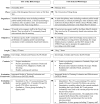Development and Evaluation of a Train-the-Trainer Workshop for Hong Kong Community Social Service Agency Staff
- PMID: 28243586
- PMCID: PMC5303710
- DOI: 10.3389/fpubh.2017.00015
Development and Evaluation of a Train-the-Trainer Workshop for Hong Kong Community Social Service Agency Staff
Abstract
Introduction: Capacity building approaches are useful in large-scale community-based health promotion interventions. However, models to guide and evaluate capacity building among social service agency staff in community settings are rare in the literature. This paper describes the development and evaluation of a 1-day (7 h) train-the-trainer (TTT) workshop for the "Enhancing Family Well-Being Project". The workshop aimed at equipping staff from different community agencies with the knowledge and skills to design, implement, and evaluate positive psychology-based interventions for their clients in Sham Shui Po, an over-crowded and low-income district in Hong Kong.
Methods: The current TTT extended and improved on our previous successful model by adding research and evaluation methods (including the Logic Model, process evaluation, and randomized controlled trial), which are important to plan and evaluate the community interventions. Evaluation of the TTT was guided by the Integrated Model of Training Evaluation and Effectiveness (IMTEE), with quantitative and qualitative methods. Quantitative data were collected from pretraining (T1), post-training (T2), and 6-month (T3) and 12-month (T4) follow-up surveys. Qualitative data were collected from four focus groups of agency staff after the intervention.
Results: Ninety-three staff from 30 community agencies attended the training, and 90 completed the baseline survey. Eighty-eight, 63, and 57 staff performed the evaluations at T2, T3, and T4, respectively. Agency staff were satisfied with the TTT. Immediate enhancement of knowledge, self-efficacy, and positive attitudes toward the training content was found at T2 (Cohen's d ranged from 0.24 to 1.22, all p < 0.05). Enhancement of knowledge of all training contents persisted at T3 and T4 (Cohen's d ranged from 0.34 to 0.63, all p < 0.05). Enhancement of self-efficacy in the use of positive psychology in intervention design persisted at T3 (Cohen's d = 0.22, p = 0.04). The skills learned were utilized to plan and develop subsequent interventions. Twenty-nine interventions were successfully designed and implemented by the agency staff, and delivered to 1,586 participants. The agency staff indicated their intention to utilize the skills they had learned for other interventions (score ≥4 out of 6) and to share these skills with their colleagues. Qualitative feedbacks from 23 agency staff supported the quantitative results.
Conclusion: Our brief TTT was effectively delivered to a large number of agency staff and showed effects that persisted up to 12 months. Our training and evaluation models may offer a template for capacity building among social service agency staff for community brief, universal family health promotion interventions in diverse settings.
Keywords: capacity building; community-based intervention; positive psychology; social service agency staff; social work; train-the-trainer; training evaluation.
Figures
References
-
- Management Sciences for Health. Challenges Encountered in Capacity Building: Review of Literature and Selected Tools, Position Paper-10. Cambridge, MA: Bennett; (2010).
-
- Alvarez K, Salas E, Garofano CM. An integrated model of training evaluation and effectiveness. Hum Res Dev Rev (2004) 3(4):385–416. 10.1177/1534484304270820 - DOI
LinkOut - more resources
Full Text Sources
Other Literature Sources
Medical


